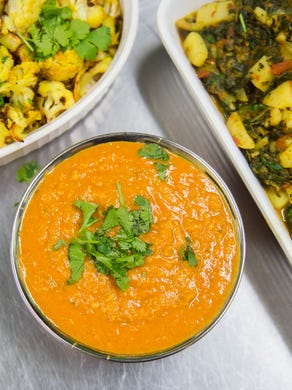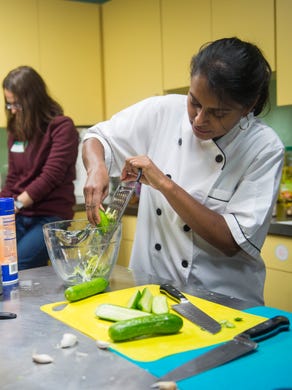Shanthi Appelö Published 7:30 a.m. ET Nov. 12, 2019
The Intergovernmental Panel on Climate Change, a body of the United Nations, recently released its Special Report on Climate Change and Land that has caused people to think twice about what’s on their plate.
The document, put together by 107 leading scientists from 52 diverse nations, highlighted the effects of meat consumption on the environment and our planet’s food supply.
The panel states that a “reduction in the demand for animal-based food products and increasing proportions of plant-based foods in diets, particularly (beans) and nuts… (are ways to adapt).”
In addition, the national Academy of Nutrition and Dietetics has noted plant-based diets are linked to healthier body weights and reduced risk for heart disease and other chronic illnesses. There are many types of plant-based diets, ranging from having no meat to some meat.
A healthy plant-based diet highlights eating heart healthy fats, plants as protein sources and high-fiber fruits, vegetables and grains. Regardless of your reason for consuming more plant-based foods, here are some things to consider.
Make a plan
When making changes in your food habits, a plan can help you along the way.
Some may start eating more plant-based foods slowly by setting a goal to limit meat intake on certain days such as “meatless Mondays”. Another idea is to designate certain meals, such as breakfast, as meat-free only meals.
Researching recipes and making a shopping list will help make your grocery experience better.
Think about the nutrients
Moving to a more plant-based diet does not mean that you must become vegetarian or vegan, though well-planned vegan and vegetarian diets are healthy and nutritionally adequate.
Some planning may be needed to ensure vegans and vegetarians are getting enough iron, zinc, vitamin B-12, calcium and vitamin D. For some who eat a limited number of foods, supplementation such as multivitamins can be helpful.
Protein intake is another consideration. The general rule of thumb for healthy adults is to get 0.36 grams per pound of body weight. This means that a person who weighs 132 lbs. (60 kg.) needs 48 grams of protein daily.
Swap the protein
Protein is an essential part of the human diet – we need protein to live.
Those who are used to getting protein from animal products as their primary source may initially have trouble thinking of ways to incorporate enough protein from plants. Protein-rich plant foods such as beans or lentils can be substituted for meat, poultry and seafood.
Playing around with different preparation methods can be helpful since beans are extremely versatile. For example, partially dehydrating black beans by roasting them in the oven makes a homemade black bean burger less mushy.
Grains, such as quinoa and soy products like tofu and edamame, are other meatless protein sources.
Nuts and seeds contain protein and can be consumed in the various forms such as nut butters (almond butter and peanut butter), in baked goods or on their own.
Watch out not to overdo the servings of nuts as they quickly add up in calories. Peanut butter packs nearly 100 calories in a tablespoon.
Beware of unhealthy foods
We discussed the health benefits of eating plant-based foods, but there are ways to eat an unhealthy plant-based diet.
Processed foods such as pre-packaged frozen meals have a reputation for convenience but having not-so-good-for-you ingredients, such as hidden salt, sugar and saturated fat.
Other foods to watch out for are frozen imitation meats, vegan desserts, veggie chips and coconut-based yogurt. Be sure to read nutrition facts labels and note calories, added sugars, saturated fat and sodium when shopping.
Following a plant-based diet can promote good health and help the environment. This does not mean you need to follow a vegan or vegetarian lifestyle to incorporate changes.
If you’re interested in making the switch, start by making small changes and do what works best for you and your family.
Shanthi Appelö is a registered and licensed dietitian nutritionist at the Knox County Health Department. She obtained her master’s degree in public health nutrition from the University of Tennessee. She can be reached at shanthi.appelo@knoxcounty.org.
Read or Share this story: https://www.knoxnews.com/story/money/business/2019/11/12/move-toward-more-plant-based-diet-these-tips/3996928002/










 1 of 9
1 of 9 2 of 9
2 of 9 3 of 9
3 of 9 4 of 9
4 of 9 5 of 9
5 of 9 6 of 9
6 of 9 7 of 9
7 of 9 8 of 9
8 of 9 9 of 9
9 of 9

